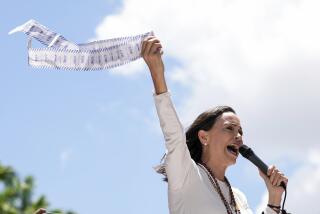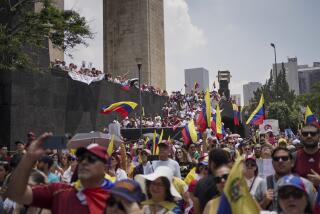Tensions build in Venezuela as Chavez prepares for vote
BOGOTA, COLOMBIA â A succession of violent incidents in Venezuela, including the armed takeover of the Caracas city hall, point to an ugly campaign ahead of a Feb. 15 vote that could lift term limits on President Hugo Chavez.
A group of 40 armed men who said they were Chavez supporters were still in control of city hall Monday evening, two days after they forced their way in, handcuffed two security officers and declared the building ârecovered for the revolution,â a mayoral spokesman said.
A previous referendum on ending term limits was narrowly defeated, and various polls indicate Chavez could lose again. Passage would change the constitution, which currently allows only two presidential terms, to allow unlimited election bids by all elected officials.
Mayor Antonio Ledezma, a Chavez critic who unexpectedly won Caracasâ city hall in November, said the government had not moved yet to restore control of the building.
âI have reminded the president that I was elected by the people of Caracas and that he should respect us just as he would be respected,â he said.
The two handcuffed officers spent eight hours tied to chairs before they were released Sunday morning, he said.
After Ledezma won, Chavez revoked the mayorâs authority over the 8,000-member police force, Caracasâ 18-hospital health system and 1,200 sports and recreation facilities around the sprawling city.
The fiery Chavez has at times used violent rhetoric, including the threat of âcivil war,â to warn of chaos if he loses the vote next month. In a speech Saturday in Carabobo state, he vowed to break up student protests with tear gas.
âThe streets are for the people, not the rich and the spoiled children of the rich,â Chavez said. âSpray them with gas and dissolve whatever barricades they put up.â
Dan Hellinger of Webster College in St. Louis said that by authorizing the use of tear gas, Chavez could be âplaying into the handsâ of elements on both sides who are âtrying to polarize the situation.â
Other incidents Monday included tear gas canisters thrown at the compound of the papal nuncio and at the house of Marcel Granier, director of RCTV, a channel that aired commentary critical of Chavez until the president ordered that its broadcast license not be renewed in May 2007.
The papal nuncioâs compound may have been targeted because the Vatican last year granted political asylum to Nixon Moreno, an anti-Chavez student leader from Merida, whom the Venezuelan government charged with sexual assault on a female police officer. The officer later denied she had been assaulted.
The government has refused to grant Moreno safe conduct to leave the nuncioâs compound and the country.
On Sunday, unknown attackers burned the car of Ricardo Sanchez, an anti-Chavez student leader at Central University of Venezuela. Attackers on Monday threw tear gas shells near the universityâs administration building.
Universities have been a caldron of anti-Chavez activity since students mobilized in 2007 to oppose the RCTV license revocation. Later that year, students organized against a Chavez-backed referendum on a set of constitutional changes, one of which was the previous attempt to lift his term limits.
After 10 years in office, Chavez remains highly popular by virtue of his social welfare programs funded by the nationâs oil wealth. In state and local elections in November, his allies won 17 of 22 states and four of every five mayoralties.
At the same time, a majority seem indisposed to permit unlimited terms, pollsters say.
Analysts theorize that Chavez is holding the referendum next month before the full impact of the global recession hits Venezuela. Such a recession could force Chavez to cut back on many of his welfare and foreign aid projects, which would reduce his popularity.
--
Special correspondent Mery Mogollon in Caracas contributed to this report.
More to Read
Sign up for Essential California
The most important California stories and recommendations in your inbox every morning.
You may occasionally receive promotional content from the Los Angeles Times.










